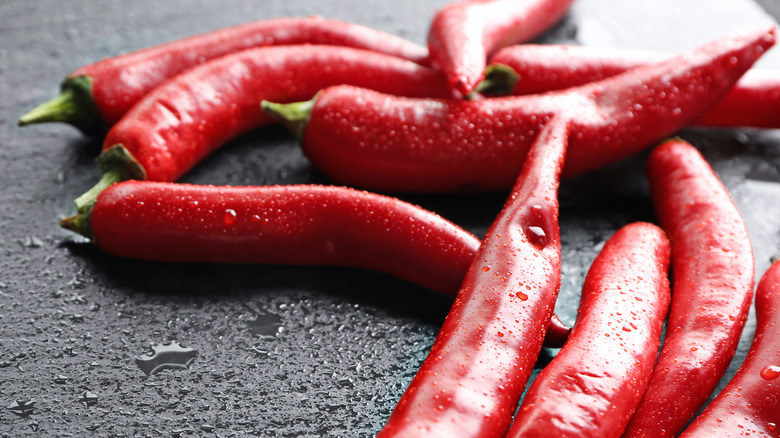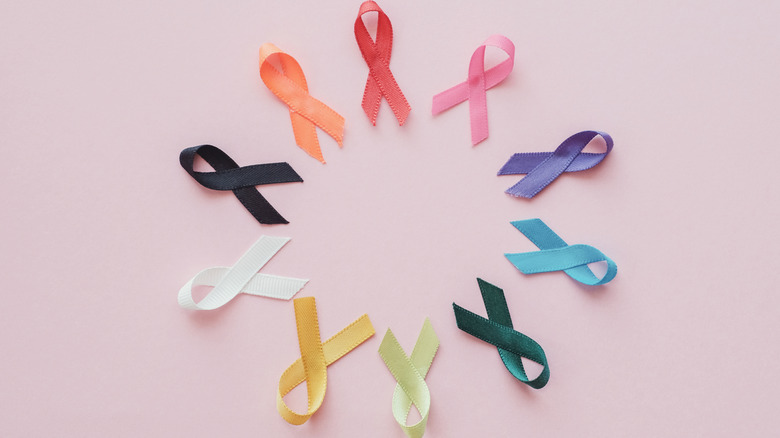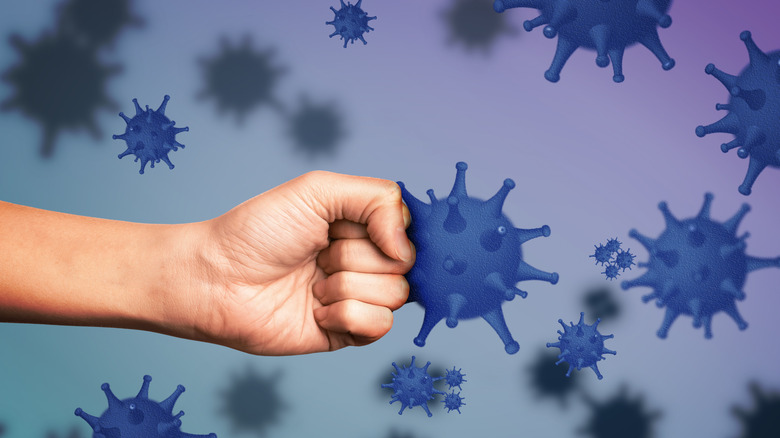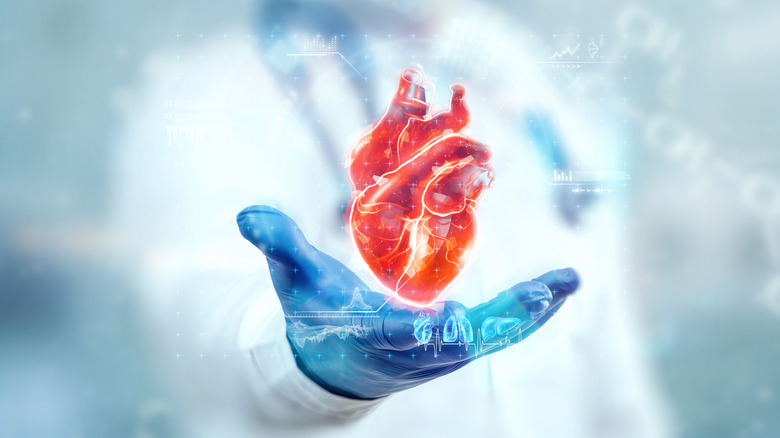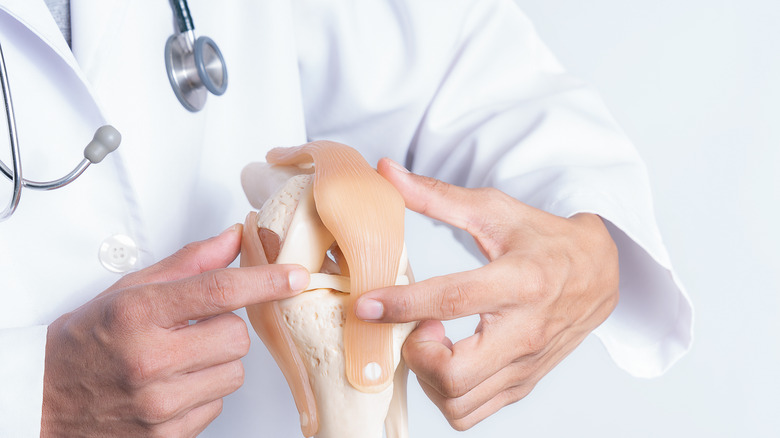When You Drink Cayenne Pepper Water, This Is What Happens
If you like spicy food and are looking for a way to boost your overall health, you might want to try adding cayenne pepper water to your everyday diet. Cayenne pepper water is made from blending ground cayenne pepper with water. It can be served either cold or hot and offers a number of potential health benefits (via Livestrong). While cayenne pepper is traditionally a cooking spice, it can also be used to treat health problems. Most of the health benefits of the beverage come from a compound in cayenne pepper known as capsaicin. Capsaicin is what gives peppers their hot and spicy kick. In a nutshell, the more capsaicin a pepper has, the hotter it will be. Cayenne pepper has a rating of 30,000 to 50,000 Scoville heat units, which means the pepper is moderately hot (via Verywell Fit).
When applied topically, capsaicin has a therapeutic effect and is often used to relieve pain and reduce inflammation. However when taken internally, the list of benefits from cayenne pepper are even more extensive. From helping to manage weight, decreasing the risk of cancer, and lowering blood pressure, cayenne pepper is considered a superfood in many ways. Continue reading to learn more about how regularly consuming cayenne pepper can affect your body.
You may lose weight
Drinking cayenne pepper water can improve your overall health, including your metabolic system. According to the Cleveland Clinic, the capsaicin in cayenne pepper can boost your metabolism through a process called diet-induced thermogenesis. Since cayenne pepper is relatively hot, it can increase the amount of heat that your body produces, which, in turn, causes you to burn more calories. This can ultimately increase your metabolic rate. A study published by the Journal of the Medical Association of Thailand confirms this fact. Researchers studied the effects of eating chili pepper on 10 healthy women and found that the women's metabolisms had increased immediately after eating the chilies, and this increase sustained for at least 30 minutes.
Furthermore, consuming cayenne pepper may actually curb your appetite and prevent you from reaching for that extra slice of pizza. Another study published by the journal Appetite observed the effects of cayenne pepper on 15 men and women and found that those who consumed more capsaicin experienced less of a desire to eat after dinner and reported feeling more full than those who consumed less capsaicin.
Your digestive health may improve
For those who struggle with digestive issues, there's good news in the form of cayenne pepper. Despite spicy food's bad rap for instigating gut trouble, the Cleveland Clinic explains that cayenne pepper can actually help get things moving in a good way as well. Registered dietitian Alexis Supan spoke to the site and said, "Cayenne pepper is really helpful for digestion. It increases gastric juices and enzyme production in the stomach, which helps us break down food."
Another way cayenne pepper can be beneficial to your gut is by helping to improve your gut microbiome. Healthline explains that the gut microbiome is essentially a collection of the trillions of bacteria, viruses, and fungi — also known as microbes — that live inside your gut. A more diverse collection of microbes in the body is generally associated with improved gut health, and can contribute to improved digestion and other key health concerns. A study published by the journal Nutrients shows a strong link between consuming cayenne pepper and an improved gut microbiome. The researchers did an experiment using a model of a human gut microbiome to observe what would happen when capsaicin was introduced. They discovered that with regular capsaicin treatment, the diversity of bacteria in the gut increased, improving the overall health of the microbiome.
You could ward off cancer
Cancer is a very scary proposition. However, some studies have shown promising results in the area of cancer prevention by way of our diets. One study published in Cancer Research found that capsaicin, one of the primary elements found in cayenne peppers, was shown to slow down the multiplication of prostate cancer cells. Another review published in the journal Anticancer Research explains that capsaicin is what is called a phytochemical. Research has shown that phytochemicals show anti-cancer activity, and that capsaicin in particular has been proven to "alter the expression of several genes involved in cancer cell survival, growth arrest, angiogenesis and metastasis." Therefore, capsaicin can both help prevent and fight existing cancer, and the study concluded that there is potential for it to be used in conjunction with other "chemotherapeutic agents" in the treatment of cancer.
Antioxidants are another powerful ingredient in the arsenal of cancer-fighting tools, and the good news is that cayenne pepper is chock full of them. According to Medical News Today, some of the antioxidants in cayenne pepper include vitamin C, vitamin E, beta carotene, choline, lutein, zeaxanthin, and cryptoxanthin. Antioxidants work to help prevent cancer by helping to rid the body of toxic substances called free radicals, which if accumulated can lead to cancer and other serious health problems (via National Cancer Institute).
Your immunity may increase
In addition to the super-ingredient capsaicin, cayenne pepper boasts a number of other vitamins and minerals. Just one 45-gram pepper offers a whopping 72% of the daily recommended value of vitamin C, according to Healthline. Vitamin C is a key element in maintaining a healthy immune system, and it is what Healthline calls an "essential vitamin," meaning the body cannot produce it itself.
Vitamin C is an antioxidant, and Healthline explains that one of the primary roles of antioxidants is to help maintain a healthy immune system by protecting the body from free radicals — when these molecules become too numerous they can cause oxidative stress, which potentially can lead to a number of chronic diseases. Furthermore, vitamin C stimulates the production of two types of white blood cells, lymphocytes and phagocytes, which can help ward off infection. And in addition to helping the body to produce the white blood cells, vitamin C also boosts their effectiveness by clearing the body of free radicals, which can be harmful to them. Lastly, vitamin C is a key element in maintaining the skin's health, helping to keep the protective skin barrier strong.
You could relieve pain and inflammation
Living with pain and inflammation is no walk in the park, especially when they're chronic. If you're experiencing either and have tried other remedies to no avail, it may be time to give cayenne pepper a try.
Inflammation is how the body responds to wounds or infections, and this can lead to other symptoms such as pain, swelling, heat, and redness at the site of injury (via Healthline). While uncomfortable, the goal of inflammation is actually to help heal the body and restore it to normal functioning. While typically inflammation subsides as the injury improves, in some cases it persists, causing other health problems (via Harvard Health Publishing). However, the capsaicinoids in cayenne pepper and other spicy chilies can help combat even chronic inflammation, according to Healthline.
Furthermore, cayenne pepper has also been shown to help relieve pain. According to Mount Sinai, the capsaicin in cayenne pepper can help reduce the amount of substance P in the body. Substance P is a neuropeptide your body sends to your brain to signal pain, and reducing the amount of substance P can cause feelings of pain to decrease.
You might be able to clear congestion
Need to get rid of that stuffy nose, stat? Take a few swigs of cayenne pepper water to get some sweet relief. While it might seem like an old wives' tale, there is actually some science behind this technique. Medical News Today explains that the capsaicin in cayenne pepper can help ease cold symptoms such as "sneezing, a stuffy nose, postnasal drip, and congestion." Indeed, a study published by The Journal of Allergy and Clinical Immunology confirmed this benefit of capsaicin. In the study, researchers offered them a nasal spray that contained capsaicin to 46 people who were experiencing non-allergic rhinitis. Of the subjects, 52% saw improvement in their symptoms within one minute of injecting the spray, and 74% of patients saw experienced relief within the first two minutes. But why, exactly, does this work? Per Medical News Today, capsaicin might shrink the blood vessels in the nose and throat. These vessels become dilated as a response to infection, causing fluid build-up and generally uncomfortable symptoms (via Lifeblood).
Don't worry: If you're not feeling brave enough to snort cayenne pepper up your nose – which we do not recommend trying, as it could cause irritation inside the nasal canal (via The People's Pharmacy) – Medical News Today says that drinking hot cayenne pepper tea can be just as effective at reducing the symptoms of congestion.
You might experience acid reflux
While consuming cayenne pepper offers a multitude of positive side effects, you may experience some unwanted ones as well. One of the more negative side effects of cayenne pepper can be acid reflux. Livestrong explains that acid reflux happens when acid from the stomach makes its way up the esophageal tract, leading to burning and irritation. Unfortunately, cayenne pepper can contribute to this experience. How, you may ask? Well, acid reflux occurs when the sphincter, which normally separates your stomach from your esophagus, does not fully close. This allows acid from the stomach to make its way up your esophagus and create that uncomfortable burning sensation. And as it turns out, the capsaicin in cayenne pepper is known to irritate the lining of the stomach, which heightens the probability of acid reflux occurring. If you experience acid reflux on a somewhat regular basis, or have been officially diagnosed with gastroesophageal reflux disease (GERD), it's probably best to pass on cayenne pepper water.
You might get diarrhea
If you've been drinking cayenne pepper water and out of nowhere get the sudden urge to run to the bathroom, you may be experiencing another unpleasant side effect. Verywell Health points out that capsaicin, the same ingredient that gives cayenne pepper its health benefits, can also trigger things to move quickly through your gut. This is because capsaicin can cause irritation in the stomach — and when this happens, your body engages in a defensive response.
As it passes through your system, capsaicin triggers what is called vanilloid receptor 1, which is a protein that essentially signals to your brain that your innards are burning — yikes! In response, the brain releases endorphins to help block any pain, and the small intestine and colon both try to push the potentially harmful food through your system as quickly as possible. Thus, diarrhea.
According to Verywell Health, it usually takes around a day or two for the diarrhea to cease. In the meantime, avoiding spicy foods, staying hydrated, and avoiding caffeine are all recommended. You might want to stay away from spicy food in general if you tend to get diarrhea after eating it, but if you can't resist, consume dairy or something sweet alongside the spicy food, as they can both cut down on the burn.
You may experience complications with your medication
If you're taking medication, consuming cayenne pepper may spell trouble in certain cases. To start, Livestrong explains that in some cases, the capsaicin found in cayenne pepper may trigger your blood pressure to increase. If you are taking medication to keep your blood pressure under control, it is best to avoid consuming cayenne pepper, as it may interfere with the effectiveness of your medication.
Cayenne pepper may also interfere with the absorption of other medications including Theophylline, a drug used to treat chronic lung conditions. This medication has the potential to be over-absorbed by the body when taken in conjunction with cayenne pepper. Another category of medication that may be affected by cayenne pepper is blood thinners. They may work in an exaggerated fashion, due to the fact that capsaicin already has an antiplatelet effect. Furthermore, the site suggests avoiding cayenne pepper if you are pregnant or nursing, as it can cause irritation and uncomfortable symptoms for the baby. There are also other medications that may have a negative interaction with cayenne pepper, so it's best to consult with your doctor about your particular situation.
Your stomach may become upset
Spicy food does have some potentially irritating side effects — and the capsaicin found in spicy food may cause more problems for those who have sensitive stomachs and digestive tracts than for those who don't, according to Livestrong. While the lining of the stomach is typically robust, eating spicy foods in high quantities can actually cause inflammation in the area, also known as gastritis. This, in turn, can cause stomach pain. Furthermore, if you have stomach ulcers, eating spicy food can make irritation worse; however, there are some cases where capsaicin can help improve symptoms of stomach ulcers by blocking pain. Finally, for those that have irritable bowel syndrome (IBS), spicy foods can make those symptoms worse in some instances. When it comes to digestive irritation caused by capsaicin, it really depends on your individual body. If you find yourself in pain or discomfort after eating spicy food, this is an indication that maybe you should avoid those spicy triggers. For others, chowing down on a spicy meal may cause no ill effects.
Your heart health could improve
Cayenne pepper has been shown to significantly reduce the risk of heart attacks, according to research. In a study published by the Journal of The American College of Cardiology, researchers studied 22,811 men and women for a total of eight years. A portion of the study population consumed peppers, and a portion did not. At the end of the study researchers found that those who consumed peppers were 40% less likely to die of a heart attack, and at least 60% less likely to die from other cardiovascular related issues.
A lead investigator of the study, Marialaura Bonaccio, an epidemiologist at the Neuromed Mediterranean Neurological Institute in Pozzilli, noted that, "An interesting fact is that protection from mortality risk was independent of the type of diet people followed. In other words, someone can follow the healthy Mediterranean diet and someone else can eat less healthily, but for all of them chili pepper has a protective effect" (via Everyday Health).
Your circulation may improve
If you regularly experience numbness, muscle cramps, or cold hands or feet, there's a chance you might be dealing with poor circulation. Healthline explains that poor circulation can be due to a number of factors, including diabetes, being overweight, artery disease, and many other conditions. Whatever the cause, there are certain foods you can eat to help relieve symptoms, and cayenne pepper is at the top of the list. According to Healthline, the capsaicin in cayenne pepper helps improve circulation by expanding your blood vessels. Therefore, blood is able to flow to your tissues more easily, and your blood pressure is lowered at the same time. In addition, capsaicin also strengthens your blood vessels and helps to keep your arteries clear of plaque buildup.
And cayenne pepper doesn't only help your circulation when you ingest it. If you need to relieve pain on a particular area of your body, you can apply a topical cream containing cayenne pepper to the affected spot, as the capsaicin can help encourage blood flow to promote healing.
Your bone health may improve
While capsaicin is by far one of the star elements of cayenne pepper, there are an abundance of vitamins in minerals in this nightshade that also serve healing purposes. Healthline explains that one serving of cayenne pepper provides 48% of the daily value of vitamin A. Vitamin A is especially good for your bones because of its effect on the cells that both create and break down your bones, according to American Bone Health. According to WebMD, our bones are in constant flux as old bone is being broken down and new bone is forming. When we're younger, bone growth outstrips the breakdown of old bone, causing us to build bone mass. Bone mass is typically highest around age 30, and after that, your body can no longer form bone as quickly as it loses it. Making sure you include enough foods in your diet that contain bone-healthy vitamins and minerals, including vitamin D and calcium as well as vitamin A, can help slow down bone loss.
Your vision may improve
Another major benefit of consuming cayenne pepper is the potential for improved vision. The vitamin A found in cayenne pepper is known to help maintain eye health — indeed, Healthline lists vitamin A as one of the top vitamins to support your eyes. This is because vitamin A plays an important role in making sure the cornea, which is the top layer of your eye, remains clear. Vitamin A is also part of the makeup of the protein rhodopsin, which enables you to see in conditions where there is little light. While most people are able to meet their daily needs of vitamin A through food, it is possible to develop a deficiency, which can lead to a progressive eye disease known as Xerophthalmia. If your vitamin A needs continue to go unmet, this disease can eventually dry out your tear ducts and eyes, soften your cornea, and lead to permanent blindness. Instead of taking supplements to up your Vitamin A intake, Healthline recommends increasing your consumption of vitamin A-rich foods.

